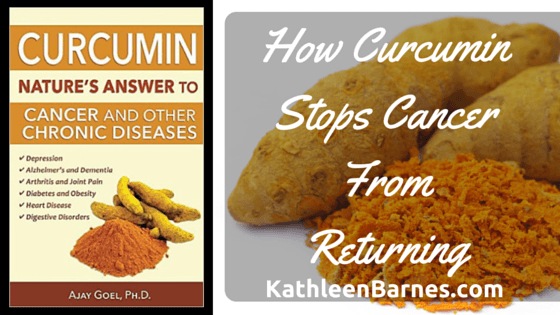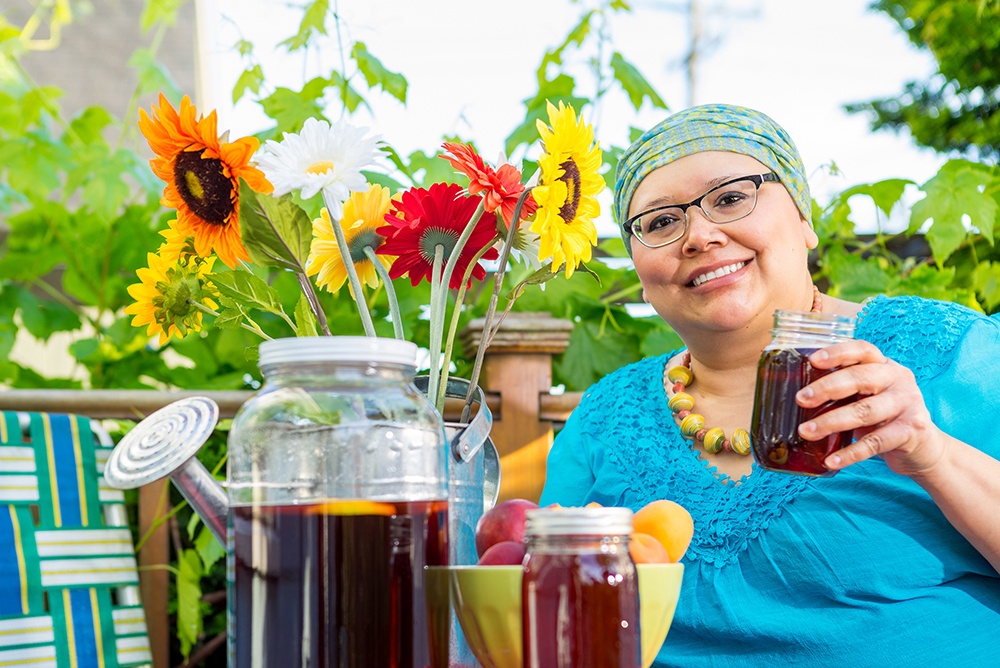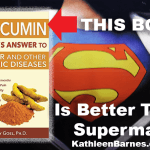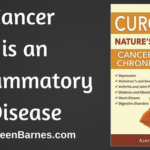Note from Kathleen: This is an excerpt from a book I recently published, Curcumin: Nature’s Answer to Cancer and Other Chronic Diseases by Ajay Goel, Ph.D., a cancer researcher at Baylor University.
We must all recognize that cancer cells are the geniuses of the biochemical world. They’re undoubtedly smarter than your average brain, bone or skin cell. Cancer cells are driven for self-preservation, with strength far beyond the survival instincts of normal cells. Like all life forms, they fight like demons to survive, but they are also incredibly intelligent, enough to thwart most attempts to kill them. It’s almost like they have their own brains.
You’ll note I said, “most,” but not “all” attempts to kill them. Curcumin steps in to interrupt the best-laid plans of genius cancer cells.
Here are three new areas for us to examine:
- Cancer stem cells: Super cells that govern other cancer cells and are astonishingly difficult to kill.
- Chemo-resistance: Cancers that become resistant to chemotherapeutic drugs that once worked.
- Chemo-sensitization: Making cancer cells more receptive to accepting the drugs that will eventually kill them.
Cancer Stem Cells
We’ve already established that most of us know someone who has had cancer. You probably already know that even with the standard cancer treatments—surgery, chemotherapy, and radiation, or any combination of these—cancer often returns. It may be three or four years or even longer, but those resistant cancer cells find a way to hide and survive, and some eventually emerge again and thrive. These are cancer stem cells and they can be deadly. When cancers return, they tend to be far more vicious and more aggressive than they were the first time around.

When a child is conceived, the egg and the sperm divide into a handful of healthy stem cells. Stem cells are the point of origination for all tissues in the body. Malleable like a child’s Play-Doh, stem cells can become any kind of cells. They can be brain cells, heart cells, pancreas cells, skin cells or hair and nail cells. Stem cells are the superheroes of the body, capable of unlimited potential.
Cancer stem cells are different. We are not born with cancer stem cells. They are a tiny subset of cancer cells themselves. They are called this because they can be the point of origination for a cancer recurrence. They can disguise themselves and lie low, avoiding chemo and radiation therapy. Then when the coast is clear, they can spring forward and start making cancer cells again.
Cancer stem cells initiate and maintain cancer, and contribute to recurrence and drug resistance. Almost like the multi-tasking white-hatted miRNAs that combat cancer, these are their alter-egos, super-cells that govern other cancer cells and command them to grow and proliferate.
Cancer stem cells are immortal—or nearly so. Think of them as super-cells. As we’ve learned in earlier chapters, cancer cells do not have a normal lifespan like healthy cells. They live on and on, reproducing in their twisted fashion, creating more cancer cells and larger tumors that spread throughout the body.
In addition, these cancer stem cells have an uncanny ability to hide from conventional medicine’s diagnostic “radar,” hiding in the deepest recesses of the body, appearing to sleep or staying quiet for months, even years, before they awaken and begin to grow again with a vengeance.
Researchers at the National Cancer Institute (NCI) suggested in a 2012 study that “inappropriate consumption of certain foods” might encourage cancer cell growth. Those same researchers also noted that curcumin has been scientifically proven to convince those unique master cells — cancer stem cells—to die at the right time.
This is a huge and exciting step forward in cancer treatment, buried in the usually dry and unemotional scientific jargon from the NCI. Curcumin may well be one of the most powerful substances known to science when it comes to eradicating cancer stem cells.
The same researchers note that even in particularly aggressive pancreatic and brain cancers, the “alarm clocks” or signaling pathways that wake up these cancer stem cells over time are shut down by curcumin. This humble botanical quite literally interrupts the chain of command between cancer stem cell colonels and the foot soldiers or ordinary cancer cells. When the colonels can no longer tell the foot soldiers what to do, they will eventually desert the cancer army, so they are no longer a threat.
My scientific community is in general agreement that targeting cancer stem cells is “a very promising concept and therapeutic option to eradicate tumors and prohibit resistance and recurrence.”
Curcumin works in many ways. In particular, it disrupts the ability of the cancer stem cells to communicate with the ordinary cancer cells. Those cancer stem cells can morph into hundreds of different types of cells, all of them malignant.
In fact, University of Michigan research suggests that curcumin molecules are as smart as their malignant opponents because they can seek out cancer stem cells (breast cancer in that particular study) and attack them, but, unlike chemotherapy drugs, do not harm healthy stem cells or any other cells at all.
Cancer stem cells can sometimes survive chemotherapy, and their survival is one of the main reasons why cancer can return after a few months or years in most patients.
Chemo-Resistance
In all my years of cancer research, I have learned that almost every cancer patient develops some degree of resistance to chemotherapy drugs.
This means that chemotherapy drugs that were effective in the earlier phases of treatment almost always stop working over time. The tumors become resistant to the drug’s intended effects and cancer cells continue to grow unchecked.
These cancer cells can be fooled once if they’ve never been exposed to a chemo drug before. The drug may destroy 95% or more of the cancer cells. The cells the chemo does not kill are the ones left to reproduce. The cancer becomes resistant to that drug. Regardless of what we throw at them, they figure out a way to develop resistance to one drug after another until we have nothing else to offer.
You already know that cancer cells have a hyper-survival mechanism. In simple terms, they don’t want to die. Remember our examination of apoptosis, or programmed cell death in Chapter 5? Well, many chemo drugs target the apoptosis pathways, reminding those nearly immortal cancer cells when it’s their time to die.
Over time, those genius cancer cells figure out a way to shut down the message. They overrule the command to bring back the natural pattern of cell death, allowing the cancer to continue to grow and spread.
Of course, they also are able to overcome the command to stop supplying nutrients to the cell clusters, overcoming all efforts to starve them.
Didn’t I tell you these cancer cells were smart?
Cancer stem cells are even stronger and more resistant to conventional therapies than those foot soldier cancer cells.
So the patient has already undergone at least one course of chemotherapy, complete with myriad side effects that can include nausea, hair loss, weight loss, muscle wasting, extreme fatigue, organ damage and more, only to learn that the cancer has returned.
The only option most doctors can offer is another course of chemotherapy with a different drug, administered in the hope that the new drug will trick the genius cancer cells into committing suicide.
The vicious circle has been set. Some of the cancer cells will die, but, until now, there have always been survivalist cancer cells that will hide out in the physiological wilderness and come back again another day.
Cancer very often returns, perhaps in the same place, perhaps in another part of the body. Doctors try another form of chemo. The patient weakens. Quality of life deteriorates to the point where it becomes intolerable. The outcome has been set almost from the beginning: The doctors eventually announce they can offer nothing else to overcome those cancer cells. The patient, in utter despair at the thought of more life-consuming drugs, loses hope.
It’s a horrible story that too many of us have witnessed, if not experienced for ourselves. It’s heartbreaking and it doesn’t have to be this way at all.
What causes chemo-resistance? You’ve probably already got a good idea: Those cancer stem cells with their superpowers are able to escape, evolve and hide from all known chemotherapy drugs.
Curcumin’s Role
And how does curcumin fit into this picture? Curcumin:
- Sensitizes cancer cells—softens them up, if you will—so chemotherapy drugs can be more effective.
- Reminds cancer cells to die, to reinstate programmed cell death or apoptosis.
- Neutralizes the cells’ over-developed survival mechanism.
- Finds alternate ways of carrying out the business of killing cancer cells, outpacing the rapid-fire “intelligence” of the cancer cells’ abilities to resist new drug therapies.
Most of my work has been on colorectal cancer, but we know from numerous other studies that curcumin’s value extends to many other types of cancer, perhaps encompassing all types of cancers.
My study in 2013 was unique because we created a colon cancer laboratory model that mimicked the human situation. We started treating colon cancer cells with different types of chemotherapy at different dosages until the cells became unresponsive to the drugs and stopped dying. Eventually, even when treated with 10 times, 50 times and even 100 times higher dosages of the chemo drugs, the cells refused to die. Interestingly, nothing killed these incredibly tough cancer cells until we brought in curcumin.
The curcumin activated everything that was needed to eliminate the cancer stem cells: angiogenesis, apoptosis and epigenetics. The cells died. This was tremendously exciting!
Then we injected those chemo-resistant cancer cells into animals and we found the same effect. We’re now planning similar research with people with advanced stage multi-drug resistant colon cancer patients. People with end stage colon cancer cannot expect to survive more than a few months. If we can give them curcumin, we may well be able to extend their lives by a month or two, or even six months, with a vastly improved quality of life. It may not be a cure, but it can certainly make a positive difference.
Chemo-Sensitization
This is a glass half full/glass half empty topic. Chemo-sensitivity or chemo-enhancement is the opposite of chemo-resistance. It means that curcumin has been found to actually help sensitize cancer cells, specifically those notoriously tough cancer stem cells, making them vulnerable to destruction by chemotherapy drugs, ending their resistance and allowing them to be killed by the drugs.
One of our studies confirms that curcumin helped improve the effectiveness of 5-fluorouracil (5-FU), a chemotherapy drug often used in patients with colorectal cancer. Although this study has been published, our research is ongoing. Our theory is that curcumin helps activate those miRNA colonels to overcome chemo-resistant cancer stem cells providing for far more effective treatment.
There is other research that confirms our theory and expands upon it, showing that curcumin increases sensitivity to several types of chemotherapy drugs in a variety of cancers: breast, colon, pancreas, gastric, liver, blood, lung, prostate, bladder, cervix, ovary, head and neck. By making the cancer cells more vulnerable to chemotherapy drugs, we have a vastly improved chance of defeating the cancers with lower doses of toxic drugs and less harm to the patient.
This includes advanced cancers that are considered inoperable.
In addition to 5-FU, research has confirmed that curcumin enhances the effectiveness of several other drugs used to treat advanced colon cancers, including irinotecan, FOLFOX, gemcitabine and celecoxib.
There’s another exciting addition in the chemo-sensitivity arena: We’ve found that curcumin also increases the effectiveness of radiation therapy and it helps protect important organs like the liver, kidneys, oral mucosa and heart from the toxic side effects of chemotherapy and radiation.
Curcumin is a safe and effective choice during every stage of cancer, on its own or when combined with chemo or radiation therapy.
Finally
Curcumin has uncanny healing and preventive powers. It does everything possible to counteract the destructive powers of cancer stem cells. My research shows that curcumin eliminates significantly more cancer stem cells than any other natural therapy currently known.
Will curcumin eliminate the cancer stem cells forever? Maybe yes, maybe no. We have studied this aspect of curcumin for several years and, while we need more research, I feel quite optimistic that ongoing and future studies of curcumin in humans will show us that curcumin can provide a cure or a much, much longer remission time than we now know.
In short, if I had any type of cancer or anyone in my family was in that position, I would absolutely use curcumin at all stages of the disease.
Most likely it would stop the disease from progressing. There are no serious side effects (sometimes a bit of loose stools at very high doses).
Of course, ideally, we can all use curcumin for prevention along with other healthy lifestyle habits and the cancer never gets a foothold. But if you or someone you love does get any type of cancer, you definitely should talk to your oncologist about using curcumin. Why not? There is nothing to lose and everything to gain.
From: Curcumin: Nature’s Answer to Cancer and Other Chronic Diseases by Ajay Goel, Ph.D., a cancer researcher at Baylor University.








